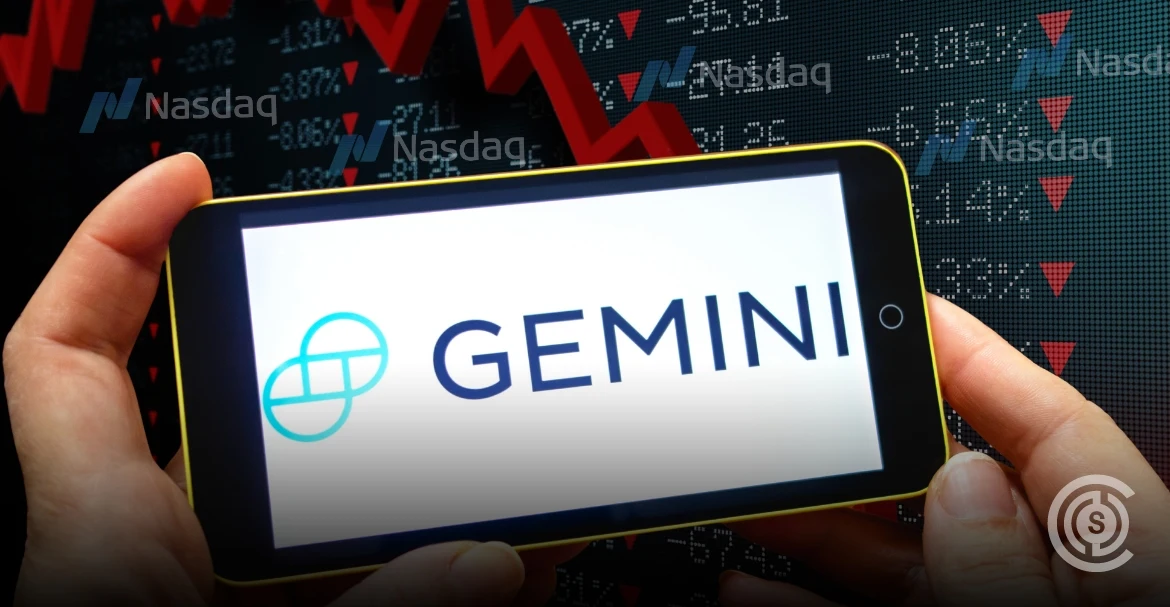Gemini Stock Falls 24% on First Day of Nasdaq IPO
Gemini Stock Drops 24% After Nasdaq Debut

- Gemini stock fell 24% in its first Nasdaq trading days despite an initial surge.
- The company raised $425 million in its IPO, achieving a $3.3 billion valuation.
- Analysts warn that steep valuations and widening losses may weigh on long-term investor sentiment.
Gemini Space Station’s first days on the Nasdaq were anything but steady, with shares tumbling 24%despite opening with early enthusiasm. The crypto exchange, led by the Winklevoss brothers Cameron and Tyler, realized a total of $425 million in its initial public offering (IPO). Its stock price was kept at $28 with a $3.3 billion valuation at the time it entered the market.
Following its debut, Gemini’s stock soared to $45.89 before consolidating at $32, a premium above the IPO price that left investors optimistic. But momentum proved fleeting, and the rapid reversal has sparked debate about whether the company’s fundamentals can justify its rich valuation amid mounting losses.
Gemini IPO Gains Fade as Valuation Meets Market Reality
The Gemini listing was one of the most closely watched debuts in the crypto sector, with investors initially treating it as a symbol of confidence in digital asset businesses. The early surge in share price reflected high expectations, particularly after the company boosted its IPO range from $24–$26 to $28 per share, signaling strong institutional demand. However, since reaching its first-day peak of $45.89, the stock has plunged more than 34%, erasing much of the opening-day gains and leaving investors questioning the sustainability of its growth story.
The drop in share price coincides with scrutiny of Gemini’s latest financial results, which show steepening losses that raise doubts about long-term profitability. The company reported a $283 million net loss in the first half of 2025, almost double the $159 million loss it posted for all of 2024. This deterioration clashes sharply with its market valuation, which Compass Point analyst Ed Engel described as “unsustainably rich.”
At present, Gemini trades at a multiple of 26 times annualized revenue, compared to an industry average closer to four. Such a premium highlights investor willingness to pay more for Gemini’s growth potential, but without profits or clear earnings visibility, that optimism looks fragile.
Analysts Doubt Gemini Stock Can Justify Premium Nasdaq Pricing
Valuation concerns have been front and center as analysts weigh Gemini against peers such as Coinbase and Circle. Engel’s calculation of fair value at $32.52 per share suggests the current price already reflects excessive optimism, leaving little room for error. For investors, paying $26 for every $1 of expected annual revenue becomes difficult to justify when profits remain elusive and competition in the crypto trading space continues to intensify. This explains why the share price has retreated so sharply within just days of its market debut.
Despite the financial red flags, Gemini has sought to project confidence by highlighting growth areas such as tokenization and crypto-linked credit card products. The company has also secured notable backers, including Nasdaq itself, which invested $50 million in a private placement ahead of the IPO. Such support adds credibility, but analysts caution that credibility alone does not offset mounting losses. Retail investors, who were offered up to 30% of the Class A shares via platforms like Robinhood and SoFi, may be particularly vulnerable if the stock continues to trade under pressure.
Crypto Stock Weakness Adds Pressure on Gemini Shares
While Gemini struggles with its post-IPO correction, other crypto-linked stocks have shown steadier results. Coinbase shares held flat over the past week, despite weaker-than-expected quarterly results and ongoing regulatory scrutiny. Earlier this week, Coinbase debunked claims that stablecoins threaten U.S. bank deposits, arguing that such concerns are more about profit protection than financial stability.
On the other hand, Circle Internet Group even managed to rally 13% in the same period, with strong short-term returns highlighting that investor appetite for digital asset companies has not disappeared. Meanwhile, Robinhood slipped 3% for the week, but its earnings outperformed expectations, providing a cushion against sharper declines.These mixed results suggest that Gemini’s decline stems more from company-specific fundamentals than from systemic issues across the sector.


